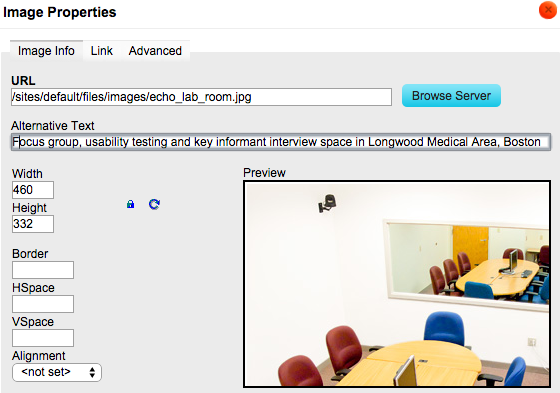Resources for researchers
Improve your website’s visibility with SEO
If you’re like most people with websites, you want your site to be seen by as many interested people as possible. Because most people will find your site via a search engine, search engines are key to your site’s visibility. “Search engine optimization (SEO)” is a strategy that aims to help websites appear (or “rank”) as high as possible in search results.
The Health Communication Core (HCC) includes SEO in our website development process for every site we create.
Understanding keywords

Keywords are words or short phrases that people type into a search engine to find websites that match what they’re looking for. The search engine then retrieves web pages based on keyword matching. To match pages, a search engine measures the way keywords are used on the pages to determine the relevance of a page to the search engine query.
To increase the likelihood that search engines will find a website, each web page should have a keyword or a short keyword phrase. After it’s identified, the keyword should appear several times in the text on the page and in the “meta description” of the page (more about this below).
HCC works with our clients to identify keywords when we are writing the content of each web page. Keywords should identify what a page is about and what terms or phrases people would commonly use when looking for the information on your page. Generally, the more specific your keywords, the better your chances of ranking higher in search engine results because there will be less competition from other pages.
Keyword tips
Once you’ve identified the keywords for each web page, here are some tips on how to use them:
At least once in a page’s meta description. A meta description is the brief text snippet that appears in search engine results below a page’s name.

Meta descriptions help people decide what to click on when viewing search engine results. For HCC’s home page, the keywords are “Health Communication Core.” Our homepage meta description, which incorporates our keywords, reads, “The Health Communication Core provides creative, evidence-based health communication services, including websites, logos, brochures and print materials, social media, and branding.”
2-3 times, including variations, within the main text on the page. Search engines like to find the keyword several times on the page. You can vary the order of the words (if your keyword is more than one word), add a minor word (a, an, then, to, etc.), or make keywords singular or plural.
On HCC’s “Our work” page, our keyword phrase is “communication services for research recruitment, retention and dissemination.” While that entire phrase doesn’t appear multiple times in the page’s text, each of the terms appears a few times.
Prominently near the top of the page. Place the keyword in the title or headline of the page, or in other text near the top of the page in bold or larger font.

On HCC’s “Contact” page, our keyword phrase is the headline of the page: “Contact the Health Communication Core.”
In the alt attribute of an image on the page. An image’s alt attribute refers to the text that appears if an image doesn’t or can’t load.

HCC’s web page about the ECHO Lab, our multimedia communication research facility, shows an image of the lab. Instead of describing the photo (one-way mirror, color-coded chairs), the alt text describes what the Lab is: Focus group, usability testing, and key informant interview space in Longwood Medical Area, Boston.
In the title tag at least once, as close to the beginning of the title tag as possible. The title tag is the text that shows up in the tab of your browser when you visit a web page.

On HCC’s “About us” page, the title tag reads “Evidence-based communication services at Dana-Farber Cancer Institute | Health Communication Core,” which incorporates all of the page’s keywords: Dana-Farber, evidence-based, health communication.
In the page’s URL. By choosing keywords when first developing or revamping your site, you’ll be able to incorporate them into the individual URLs of each of your site’s pages for consistent navigation, menu names, and keyword integration.

Contact us if you’d like to discuss how we might help increase the visibility of your website or to explore how any of your projects might benefit from communication services: health_communication@dfci.harvard.edu or 617-632-5078.
If you’re interested in learning more about SEO, we recommend Moz’s free resource, The Beginner’s Guide to SEO.
